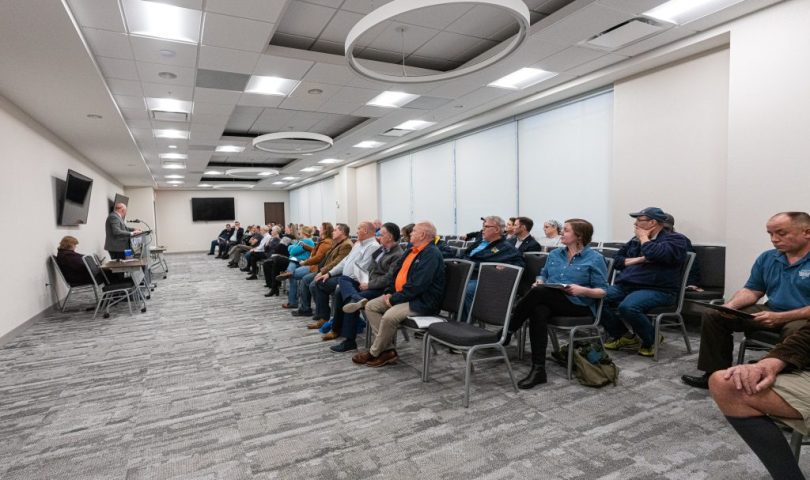BY MIKE NOLTING
About 25 people attended the Morgantown Public Employees Insurance Agency (PEIA) meeting Tuesday night.
Those who spoke expressed concerns about cost and a lack of timely communication during debate over Senate Bill 268, the measure designed to stabilize the health insurance fund for public employees.
UMWA representative Chad Francis said he’s heard legislators talk a great deal about improving benefits for state workers to retain and attract more, but SB 268 was a step in the wrong direction. Francis believes if lawmakers are serious about their concerns, they will meet before the next session to reevaluate changes to PEIA.
“We’re not able to find state employees now; we’re having problems,” Francis said. “They’re underpaid, overworked and there’s a huge budget surplus, and this year we’re cutting PEIA benefits? This is going to be detrimental to a lot of families.”
SB 268 adds a surcharge for spouses of policyholders, increases premiums to return to an 80%-20% employer-employee split, and increases reimbursement to providers to a minimum of 110% of Medicare levels.
Option one includes an increase in state employee premiums of almost 24%. The increase will vary from plan to plan. For the non-state fund, there is a proposed 15.6% increase, and no premium increase would be imposed on retirees.
The second option allows a slightly lower increase in premiums with higher deductibles and uses out-of-pocket and prescription costs to make up the cost difference.
Non-state plans opting in under Option 2 would see their premiums increase by 9.7%, their deductibles and out-of-pocket expenses increase by approximately 35%, and their prescription drug costs increase as well.
The third option includes a 14.6% premium increase, with retirees being exempt. Changes to non-Medicare would be a 50% deductible increase under plan tiers, an increase in out-of-pocket expenses and an increase in prescription co-pays or drug costs.
During the same legislative session, lawmakers cut the personal income tax by 21.25% and gave state employees a $2,300 annual pay raise.
State employee Michelle Roman told the group Tuesday all state employees are not eligible for the same benefits, and because of that, she is left paying more for insurance with less take-home pay — all at a time when inflation continues to hit families and student loan payments will soon resume.
“Our representatives in the House and Senate, I have a problem with the fact that they were stating that all employees would get this pay raise that was going to offset the increase in premiums, and that’s just not true,” Roman said.
For Roman, she said the increases didn’t come as a surprise, but what did was the size of the cost increases and the lack of communication with state workers.
“I expected increases, and I really don’t have a problem with increases,” Roman said. “What I have a problem with is the amount of the increase and the fact that it was sprung on us at the last minute.”
Department of Transportation employee Tom Coulter said the raise and tax cut didn’t add up in his household either. He explained that some of his co-workers have just decided to move on.
“Some of them are going to go ahead and retire, and several others are going to be looking for a different type of work,” Coulter said.
West Virginia Education Association (WVEA) president Dale Lee expressed concerns on behalf of retirees. Retirees will not have a premium increase for the first three years, and Lee said lawmakers have the means to prevent a premium increase for retirees who are largely on fixed incomes.
“The legislature has the PEIA Rainy Day Fund with $74 million in it, and it would cost less than $37 million to pick up those premiums for the retirees in the next three years,” Lee said. “That’s a no-brainer.”
One more public hearing will be held in Martinsburg at the Holiday Inn at 6 p.m. today.
The PEIA Finance Board will consider public comment from all four public meetings at its 1 p.m. Thursday meeting in Charleston.




